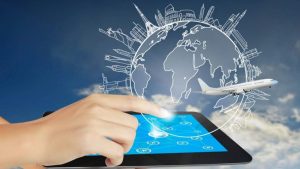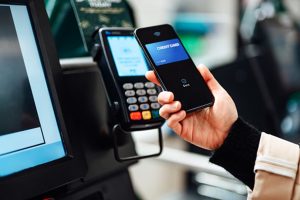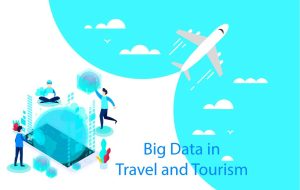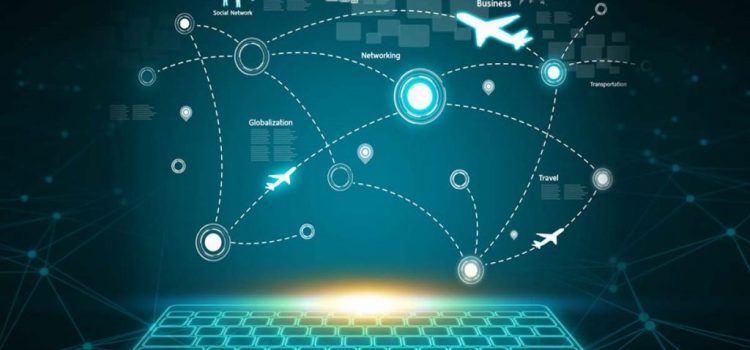
Tech Travel Tourism is revolutionizing the travel industry, making travel experiences more accessible, streamlined, and personalized. Innovations like artificial intelligence, virtual and augmented reality, IoT, and blockchain technology add incredible value, helping the industry serve travelers in unique and impactful ways. Here, we explore how each of these technologies is shaping travel and tourism, with benefits, case studies, and examples to illustrate their real-world applications.
1. AI-Powered Customer Service: Enhancing Traveler Support

Artificial Intelligence (AI) is transforming customer service across the travel industry. Through AI chatbots, companies like Expedia and Booking.com now provide instant assistance for booking changes, itinerary adjustments, and personalized recommendations.
Benefits:
- Instant Support: Provides 24/7 assistance for travelers’ queries.
- Personalized Recommendations: Analyzes past data to offer tailored destination suggestions.
- Cost Savings: Reduces dependency on large support teams, making operations more efficient.
Case Study: Booking.com and AI Chatbots
Booking.com introduced an AI chatbot to help travelers with booking and travel-related queries. During the 2020 pandemic, this chatbot played a critical role, fielding customer questions about travel restrictions and health guidelines. The chatbot reduced Booking.com’s customer service inquiries by 30%, proving essential in maintaining service quality during high demand.
Example: Expedia’s AI tools use customer data to suggest vacation packages, accommodations, and activities based on each traveler’s unique preferences, making the planning process faster and more personalized.
2. Virtual and Augmented Reality: Bringing Destinations to Life

Virtual Reality (VR) and Augmented Reality (AR) are reshaping how travelers explore destinations. With VR, travelers can “visit” locations before they book, helping them make confident choices. Meanwhile, AR enhances the on-site experience, adding interactive information overlays at museums, historical sites, and even hotels.
Benefits:
- Informed Decision-Making: Travelers can see destinations virtually before booking.
- Enhanced Experiences: AR apps enrich in-person visits, offering additional context or historical insights.
- Greater Accessibility: VR makes travel experiences available to those unable to travel.
Case Study: Thomas Cook’s “Try Before You Fly” VR Campaign
Thomas Cook launched a VR initiative allowing customers to preview destinations through virtual tours. As a result, certain locations saw a 190% increase in bookings. The campaign highlighted how VR can influence travelers’ decisions, giving them a realistic taste of what to expect.
Example: The British Museum uses AR to guide visitors through its exhibits, providing added historical details and interactive elements that enhance the visitor experience.
3. Biometric Authentication at Airports: Streamlining Security
Biometric systems, which use facial and fingerprint recognition, have greatly enhanced airport security and convenience. This technology reduces wait times by automating identification processes, making it easier for passengers to board flights and pass through checkpoints.
Benefits:
- Improved Efficiency: Biometric checkpoints reduce wait times at airports.
- Enhanced Security: Facial recognition provides a secure method for verifying travelers’ identities.
- Convenience for Travelers: Travelers no longer need to present physical documents repeatedly.
Case Study: Dubai International Airport’s Biometric Gates
Dubai International Airport introduced facial recognition gates, which significantly reduced check-in and boarding times. Since implementing this system, the airport has reported a 40% increase in passenger processing speed, enhancing both security and convenience for travelers.
Example: Atlanta’s Hartsfield-Jackson Airport also uses facial recognition technology at its international terminal, allowing travelers to check-in, go through security, and board flights with just a facial scan.
4. Mobile Integration and Contactless Payments: Redefining Convenience

Mobile technology has transformed how travelers interact with the tourism industry. With contactless payment options, digital boarding passes, and travel apps, mobile integration has made travel planning and management more accessible and efficient.
Benefits:
- Enhanced Convenience: Mobile apps consolidate booking, payment, and itinerary information in one place.
- Increased Safety: Contactless payments reduce the need for physical transactions, supporting health measures.
- Personalized Travel Plans: Mobile apps offer real-time updates, guides, and reminders, improving the travel experience.
Case Study: Airbnb’s Mobile-Only Booking Options
Airbnb has optimized its platform for mobile use, enabling users to book stays, pay, and communicate with hosts from one app. During the pandemic, this shift to mobile helped Airbnb handle an influx of last-minute bookings, reducing administrative burdens on hosts and guests.
Example: Google Maps’ travel integration allows users to store itineraries, view real-time public transportation options, and locate nearby attractions, enhancing the travel experience with convenience and guidance.
5. Internet of Things (IoT) in Hospitality: Smart and Personalized Experiences
The Internet of Things (IoT) is enabling hotels to deliver personalized and responsive service. IoT devices in hotel rooms allow guests to control lighting, temperature, and entertainment options, creating a highly customized experience.
Benefits:
- Personalized Experiences: Guests can adjust room settings to their preferences.
- Efficient Service: Hotels can monitor room usage and respond to maintenance needs quickly.
- Eco-Friendly Options: IoT enables energy-saving practices by adjusting power use based on occupancy.
Case Study: Hilton’s Connected Rooms
Hilton introduced “Connected Rooms” in select locations, where guests use a mobile app to control room settings. By allowing users to adjust lighting and temperature via their phones, Hilton reported a positive impact on customer satisfaction and an improvement in energy efficiency.
Example: Marriott Hotels uses IoT to manage room services, such as notifying housekeeping when a room is unoccupied, reducing unnecessary labor and energy use.
6. Blockchain for Secure Payments and Identity Verification
Blockchain technology is enhancing security and transparency in the travel industry. With blockchain, transactions and identity verifications are secure and immutable, making international travel safer and reducing fraud.
Benefits:
- Enhanced Security: Blockchain’s encrypted ledger ensures safe transactions.
- Improved Transparency: Blockchain records transactions permanently, reducing fraudulent activities.
- Efficient Identity Verification: Blockchain eliminates the need for physical documentation, streamlining border processes.
Case Study: LockChain for Hotel Bookings
LockChain introduced blockchain technology to hotel bookings, allowing customers to pay directly to property owners without intermediaries. This blockchain-based model reduced booking fees by nearly 20%, highlighting how blockchain can offer cost-effective solutions for travelers.
Example: The International Air Transport Association (IATA) is piloting blockchain to streamline travel pass verification, ensuring secure handling of personal data.
7. Predictive Analytics for Travel Planning

Predictive analytics uses data to anticipate travelers’ needs, such as peak travel times, weather trends, or flight price changes. This allows travelers to make informed decisions and avoid crowded periods or find budget-friendly options.
Benefits:
- Better Decision-Making: Travelers receive real-time data on flight and lodging availability.
- Cost Savings: Predictive analytics helps travelers find budget-friendly booking windows.
- Reduced Overcrowding: Travelers can avoid peak times by using data-driven insights.
Case Study: Hopper’s Price Prediction Technology
Hopper, a travel app, uses predictive analytics to forecast airfares and hotel rates, helping users save on bookings. According to Hopper, this technology has saved travelers an average of 10-15% on flights, making it a go-to for budget-conscious travelers.
Example: Skyscanner’s fare alerts notify users of price drops, helping them secure the best deals based on predictive data.
8. Eco-Friendly Tech Innovations: Supporting Sustainable Travel
Eco-friendly technology is making it easier for travelers to reduce their carbon footprint. Apps offer options for sustainable travel routes, accommodations, and activities, promoting green practices in tourism.
Benefits:
- Reduced Environmental Impact: Eco-friendly tech promotes sustainable travel options.
- Cost Efficiency: Using eco-friendly transport and accommodations often results in savings.
- Appeal to Conscious Travelers: Many travelers prefer companies that prioritize sustainability.
Case Study: Eco Companion’s Sustainable Travel Platform
Eco Companion offers a platform that connects eco-conscious travelers with sustainable tour operators and hotels. This platform has attracted an increase in green-minded users, showing that sustainability is a growing priority for travelers.
Example: JetBlue’s carbon offset program allows travelers to offset their flight emissions, giving eco-conscious passengers a more sustainable option.
9. 5G Connectivity: Enhancing Digital Experiences
The rise of 5G connectivity has made high-speed internet accessible even in remote locations, enabling travelers to live stream and access digital information without interruptions.
Benefits:
- Improved Access: 5G allows for uninterrupted streaming and communication in remote areas.
- Enhanced On-the-Go Experience: Travelers can easily access travel guides, maps, and streaming services.
- Increased Productivity: High-speed connectivity enables digital nomads to work efficiently while traveling.
Case Study: South Korea’s 5G-Enabled Smart Cities
South Korea implemented 5G in smart cities like Seoul, enhancing tourism with augmented reality city guides, instant language translation, and seamless digital navigation. This technology elevated the tourism experience, particularly for international visitors.
Example: AT&T’s 5G services in major U.S. cities provide travelers with fast and reliable internet, facilitating remote work and real-time information access.
10. Big Data for Personalized Marketing in Tourism

Big data allows tourism companies to track consumer preferences, creating personalized marketing campaigns that resonate with individual travelers. This data-driven marketing approach improves customer satisfaction and engagement.
Benefits:
- Improved Personalization: Companies can tailor suggestions to travelers’ preferences.
- Increased Engagement: Data-driven marketing makes promotions more relevant.
- Cost Efficiency: Targeted marketing reduces ad spend by reaching interested users.
Case Study: Delta Airlines’ Data-Driven Customer Insights
Delta Airlines uses big data to personalize customer experiences, from booking to in-flight services. By analyzing customer data, Delta sends tailored offers and reminders, increasing customer engagement and loyalty.
Example: Airbnb’s personalized email marketing leverages big data to suggest properties similar to what a user has previously browsed, enhancing their likelihood of booking.
Final Thoughts
The intersection of technology and travel is redefining how we experience the world, making journeys more seamless, sustainable, and personalized than ever. From AI-driven support and immersive VR experiences to secure blockchain payments and eco-friendly options, Tech Travel Tourism is shaping the future of the industry with innovations that cater to both traveler demands and global challenges. As these technologies continue to evolve, they hold the potential not only to enhance convenience and enjoyment but also to drive responsible tourism, bridging accessibility and environmental stewardship in new ways. For travelers and the tourism industry alike, the future is as exciting as it is transformative, promising a connected world where technology enables us to explore with greater ease and purpose.









